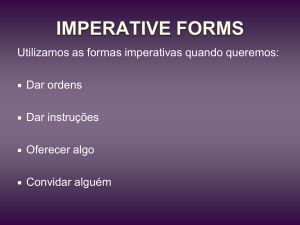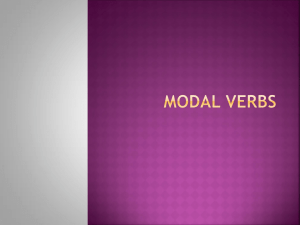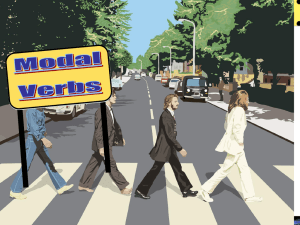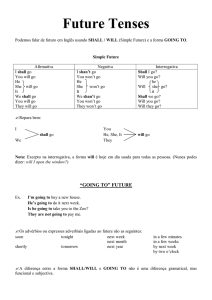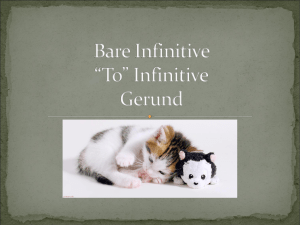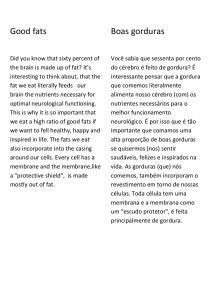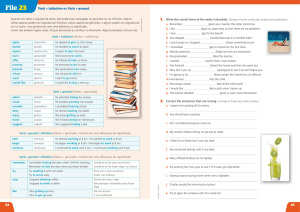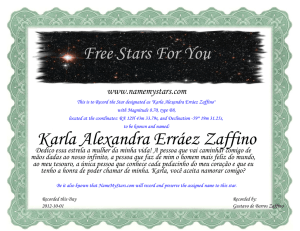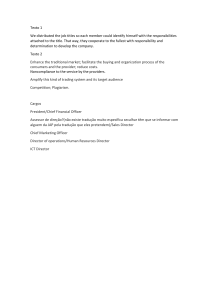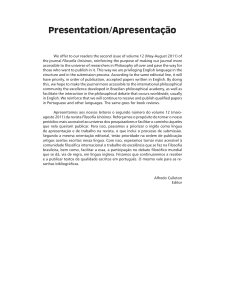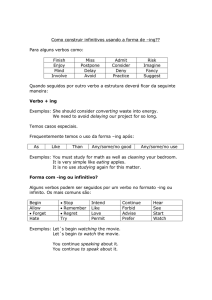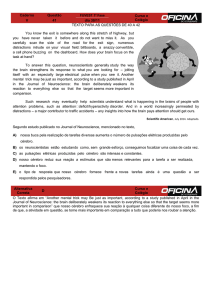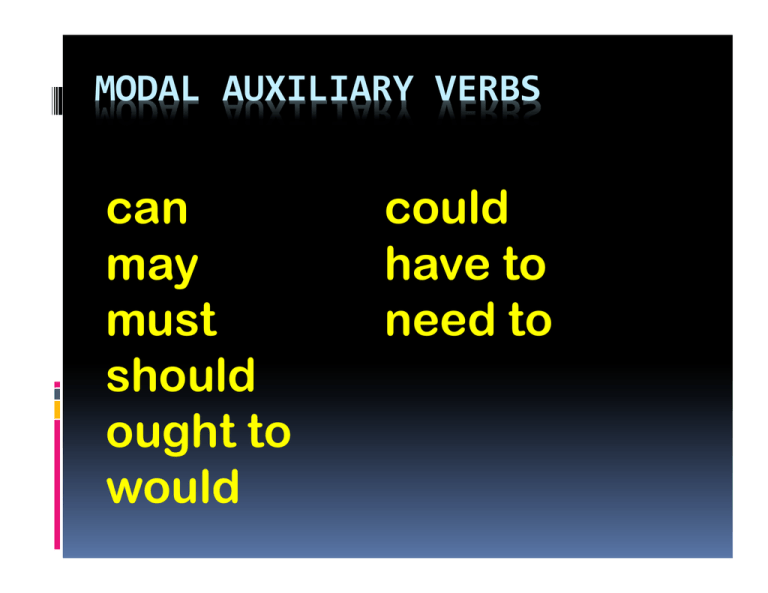
MODAL AUXILIARY VERBS
can
may
must
should
ought to
would
could
have to
need to
MODAL AUXILIARY VERBS
can
may
must
should
ought to
would
could
have to
need to
MODAL VERBS
CARACTERÍSTICAS DIFERENTES DAQUELAS DOS
OUTRO VERBOS:
NÃO TÊM S/ES NAS 3ª PESSOAS DO SINGULAR
NO SIMPLE PRESENT.
NÃO TÊM INFINITIVO.
SÃO SEGUIDOS DE OUTROS VERBOS NO
INFINITIVO SEM O ‘TO’ EXCETO O VERBO
OUGHT, QUE É SEMPRE SEGUIDO DE INFINITIVO
COM ‘TO’.
CAN
Geralmente indica capacidade/habilidade (be
able to; know how to) ou grande
possibilidade.
I can speak two languages.
Pode indicar permissão informalmente.
Can I go to the restrooms?
COULD
Equivale ao past ou conditional de can.
Mark could swim really fast when he was 8.
The teacher said I could come to class a little
later the next morning.
Will be able to
Equivale ao futuro de can.
You will be able to drive a car when you turn
18.
I’ll be able to help you after class.
FORMAS NEGATIVAS
CAN – CAN’T OR CANNOT
COULD – COULDN’T OR COULD NOT
WILL BE ABLE TO – WILL NOT BE ABLE TO
WILL BE ABLE TO – WON’T BE ABLE TO
MAY
Permissão formal;
Certa probabilidade ou possibilidade;
Votos de que algo ocorra (presente, futuro).
May I leave the classroom?
MIGHT ou MAY
São sinônimos quando indicam
probabilidade.
The teacher told the students they may /
might not pass the exams.
He said he may / might be back for the first
class.
MIGHT ou MAY
May sempre terá uma
probabilidade maior de
acontecer.
MAY/MIGHT + HAVE + PAST PARTICIPLE
Indica que algo pode/poderia ter acontecido.
Peter isn’t home. He may have gone to
church.
The cook might have used salt instead of
sugar.
MAY/MIGHT
Negative form:
May not
Might not = mightn’t
PROBABILITY
The phone is ringing. It might be Tim.
The phone is ringing. It could be Tim.
The phone is ringing. It may be Tim.
PERMISSION
Relatives can visit you at any time.
Relatives may visit you at any time.
Relatives are allowed visit you at any time.
MUST
Indica obrigação, necessidade (have to) ou
dedução (presente e futuro).
The maid must clean the house every day.
Harriet’s car is outside. She must be at home.
MUST + have + Past Participle
Indica que algo deve ter ocorrido (dedução
passada).
The kids are very happy. Their team must
have won.
MUST
Negative form:
Must not
Mustn’t
WILL HAVE TO
Equivale ao futuro de MUST (para obrigações
/ necessidades).
In the future you will have to (must) study
harder to improve your grades.
They will have to explain themselves.
SHOULD AND OUGHT TO
Normalmente indicam conselho,
recomendação, expectativa.
The weather is not good today. You should
(ought to) wear a raincoat.
They should (ought to) have paid his bills.
SHOULD AND OUGHT TO
Formas negativas:
Shouldn’t – should not
Ought not to
Time to exercise

